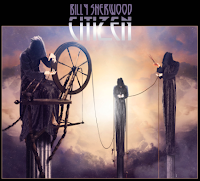Frontiers Music srl
All Access Rating: A-
 |
| Billy Sherwood - Citizen 2015 |
Like all the scripts from "Quantum Leap" all rolled into one sprawling concept album, the Frontiers Music srl release Citizen imagines "a lost soul reincarnated into various periods of history" that isn't Scott Bakula. Still, the cast of Citizen is impressive, as Sherwood draws on the talents of prog-rock innovators Geoff Downes, Steve Hackett, Steve Morse, Rick Wakeman and Jordan Rudess – just to name a few – to bring his vision to life. What's more, Squire actually plays on the triumphant and expansive title track, thought to be his final recording.
Sherwood's "citizen" finds himself either caught up in a series of cataclysmic world events, such as the Great Depression and World War I, or witnessing the birth of paradigm-shifting scientific discoveries, once as a friend to Galileo or another time as an assistant to Charles Darwin. All the while, Citizen's sweeping, slow-developing melodies, layers of harmonies, soft instrumental interplay and breathtaking, cinematic beauty seem attuned to the somber and surreal artwork that graces its cover in standout tracks "No Man's Land," "Just Galileo and Me" and "The Great Depression."
More watery and ominous, "Empire" turns starry and its choruses grow wider, while "Trail Of Tears" – a song about the forced migration of Native American peoples in the U.S. – is an edgier puzzle of sharp confusion sussed out in a manner signifying rage at the ruinous cruelty and injustice of such a monstrous policy. Lighter and more lively, with some splashes of funk thrown into the mix, "Age of the Atom" practically dances about, as Sherwood's bass lines, so plush everywhere else, offer contrasting melodic forays, but in the end, it's the accessibility and drive of "Man and the Machine" that wins the day. Not so different from the music of Yes, the compositions here, while cut from the same cloth, are more lush and elegantly designed, even if Citizen does tend to infuriatingly dawdle at a somewhat leisurely pace. That won't matter to those with a lot of time on their hands; their patience will be rewarded with an immersive experience, both lyrically and musically. If Citizen is any indication, Squire has left Yes in good hands with his protege.
– Peter Lindblad



